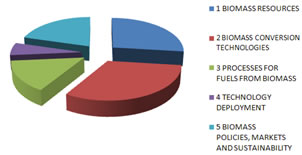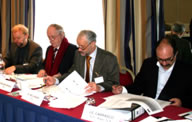 |
 |
| European Biomass Conference and Exhibition News No. 9 |
 |
|
Dear Colleagues
of the Global Scientific Biomass Community, One of the major causes of climate change is the generation of energy. Biomass can serve as a substitute for nearly all types of energy. The decisive advantage is the neutral CO2 balance, if biomass is used in an environmentally sustainable way. Therefore our approach must be one of drawing clear distinctions when we talk about the use of biomass as an energy carrier. The German Advisory Council on the Environment calculated the national potential of biomass within several scenarios and proposes an essential role for energy from biomass. Especially as operating reserve, energy from biomass will be an important element of the future energy power generation. The limiting factor for the production of biomass is the finite area. Facing the nutrient demands for a growing global population almost all fertile ground will be needed for food production. Furthermore, climate unfriendly land-use changes are able to turn the bioenergy eco-balance into the opposite. So we are determined to focus on using the big potential of biogenic residues. Straw, the biogenic fraction of municipal waste and other organic waste materials are only a few examples of bioenergy sources that until now have not been used in every country to their possible extend. However the use of such materials can also represent certain technological challenges, like flue gas cleaning or the application of more complex conversion technologies. And there is another competing use of agricultural areas that is the biochemical conversion of crops, primarily to substitute raw materials for the chemical industry. The use of renewable resources for the generation of base chemicals, bio-based polymers or even pharmaceuticals provides new dynamic perspectives. Because of the rising prices of crude oil, these applications will soon offer much more Economic Value Added than energy crops. Thus, cascade use is the key towards sustainable biomass utilisation. In this case there is even no contrast between recycling and energy production, assumed that the conversion process is thought through in advance and contains optimised recycling technologies for combustion residues (or their development, where these technologies are missing). All these issues are just a taste of the exciting topics I am pleased to discuss with you in early June 2011. I will be supported for the Coordination of the Technical Programme by Dr. Heinz Ossenbrink, Dr. David Baxter and Dr. Jean-François Dallemand from the European Commission, Directorate General Joint Research Centre. We are glad to welcome you on June 6th 2011 in the beautiful city of Berlin, the appropriate place to talk about such a future-oriented topic. Prof. Dr. Martin Faulstich, |
 |
 |
 |
Dear Participant
of the 19th European Biomass Conference, |
 |
|
We proudly
report that more than 970 scientific and industry papers have been submitted for
the 19th European Biomass Conference and Exhibition. This years 979 abstracts
represent an increase of 140 in comparison with the previous conference in Lyon
(833 abstracts). |
 |
 |

|
The Conference
Programme is being prepared under the guidance of leading members of the global
biomass community. The international biomass Scientific Committee, comprised of
more than 150 prominent experts in their respective fields, is committed to
develop an attractive and well balanced Conference Programme. Each submitted
abstract is reviewed by 3 independent Paper Review Experts on average plus the
Session Organisers. At least two Session Organisers from the International
Scientific Committee work together as a team for each Conference subtopic,
resulting in a final evaluation and selection of abstracts to compose a
Conference Programme of highest scientific quality. |
 |
|
In conjunction with the 19th European Biomass Conference and Exhibition, the Directorate General for Energy of the European Commission, in cooperation with Hart Energy, is organising this Workshop aiming to:
The Workshop will address all critical issues along the value chain from algae species selection, to cultivation, to harvesting, and to downstream processing to biofuels, biochemicals, biomaterials and algae related biorefineries. If you are interested in participating as a speaker for oral or poster presentations, please contact: Kyriakos.Maniatis@ec.europa.eu & MSoaresPinto@hartenergy.com The Workshop
Chairpersons, |
 |
|
Please
contact: |
 |
 |
||||
| Realization and International support | ||||||
 |